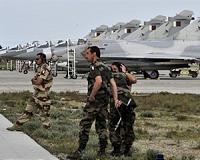 |
Washington (AFP) March 31, 2011 The US military's top officer said Thursday bad weather in Libya had hampered a coalition air campaign this week, allowing Moamer Kadhafi's forces to advance. "The biggest problem the last three or four days has been weather," Admiral Mike Mullen, chairman of the Joint Chiefs of Staff, told senators. "We have not been able to see through the weather or get through the weather to be able to do this kind of identification" of targets, Mullen said. "And that has more than anything else reduced the impact... reduced the effectiveness, and has allowed the regime forces to move back to the east," he said. Kadhafi's forces had consolidated their positions to the south of Ajdabiya and were expected to renew an offensive towards Benghazi, Mullen said. Ajdabiya is the last major town at the strategic crossroads to the rebel bastion city of Benghazi.
earlier related report An armada of ships and warplanes from the United States, France, Britain, Canada and other coalition nations came under NATO control after the 28-nation military organisation overcame internal divisions to take over the mission. US, British, French, Canadian, Danish and Belgian jets have attacked Moamer Kadhafi's ground forces since March 19 under a UN mandate to use "all necessary measures" to protect civilians. Canadian Lieutenant General Charles Bouchard, commander of Operation Unified Protector, said NATO aircraft had flown 90 missions since the alliance took charge at 0600 GMT. "Those who are acting against the civilian population and civilian centres, you would be ill-advised to continue such activities, I recommend that you cease these activities," Bouchard told reporters via videolink from his headquarters in Naples, Italy, stressing that NATO would remain "impartial." The United States, already stretched after a decade of combat in Afghanistan and a fragile situation in Iraq, had been eager to hand over control of the operations to someone else. NATO Secretary General Anders Fogh Rasmussen said the alliance will be able to declare "mission accomplished" when "the civilian population in Libya is not under threat any longer." But he acknowledged it was impossible to know when this would happen, and he stressed that a political solution, not just military means, was needed to resolve the conflict. "I urge all parties to seek a political decision sooner rather than later and ensure a political transition to democracy. But I'm not able to lay out a timetable," he said at a conference in Stockholm. The alliance stressed it would stick to the UN mandate to shield civilians, as Rasmussen reiterated his opposition to arming the rebels. The head of NATO's military committee, Italian Admiral Giampaolo Di Paola, said there was no discussion about deploying troops. He also denied that NATO was coordinating its operations with the rebels. Asked about reports that the CIA was on the ground in Libya, Di Paola said NATO does not question the source of intelligence it receives from allies. Di Paola said he expected some 20 NATO allies to provide assets for one or all three operations under alliance control -- the strikes on ground forces threatening civilians, a no-fly zone, and an arms embargo. But key NATO members have voiced unease about the bombing missions. Bouchard vowed that NATO pilots would conduct their missions "with care and precision" in order to "avoid harming the people of Libya." The general launched a probe into allegations made by a Tripoli-based Italian bishop that dozens of civilians were killed during coalition bombings. No date was given for the incident, which could not be independently verified. Turkey, NATO's sole Muslim member, criticised the scope of the coalition strikes that began on March 19 and has made clear its planes would not take part in any air strikes. Another major NATO member, Germany, refused to vote for the UN Security Council resolution that authorised the use of force and will stay out of the offensive operations. The Netherlands has contributed planes but they will only participate in a no-fly zone to prevent hostile jets from flying, not the strikes against other targets. NATO wants to bring outside partners into the mission, especially Arab nations. Qatar and the United Arab Emirates are the only Middle Eastern nations to have provided jets. Sweden, a NATO partner but not member, offered fighter jets but said it would not conduct ground strikes.
Share This Article With Planet Earth
Related Links
 Years of Franco-Qatari cooperation in practice over Libya
Years of Franco-Qatari cooperation in practice over LibyaSouda, Greece (AFP) March 31, 2011 Brought together by a common cause and a shared experience, French and Qatari fighter crews are flying joint missions out of Greece to enforce the UN-mandated no-fly zone over Libya. A section of the Greek base of Souda on the island of Crete has now become home for the two nations' pilots and some 300 personnel helping to keep up twice-daily sorties in Libyan airspace against Moamer Kadhafi ... read more |
|
| The content herein, unless otherwise known to be public domain, are Copyright 1995-2010 - SpaceDaily. AFP and UPI Wire Stories are copyright Agence France-Presse and United Press International. ESA Portal Reports are copyright European Space Agency. All NASA sourced material is public domain. Additional copyrights may apply in whole or part to other bona fide parties. Advertising does not imply endorsement,agreement or approval of any opinions, statements or information provided by SpaceDaily on any Web page published or hosted by SpaceDaily. Privacy Statement |